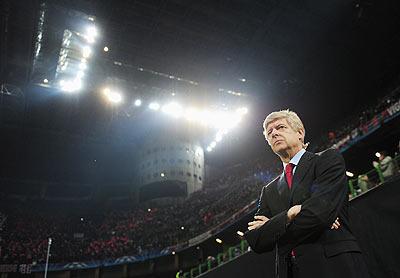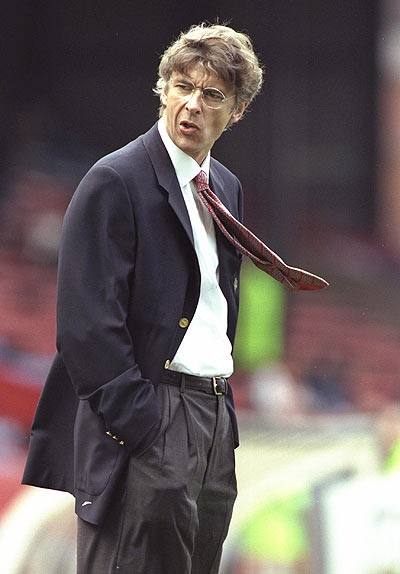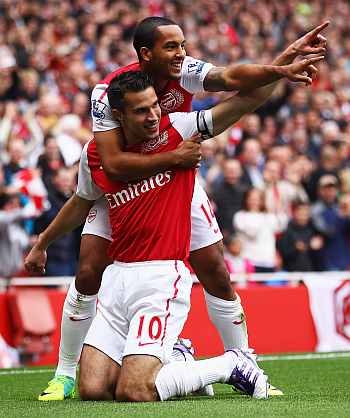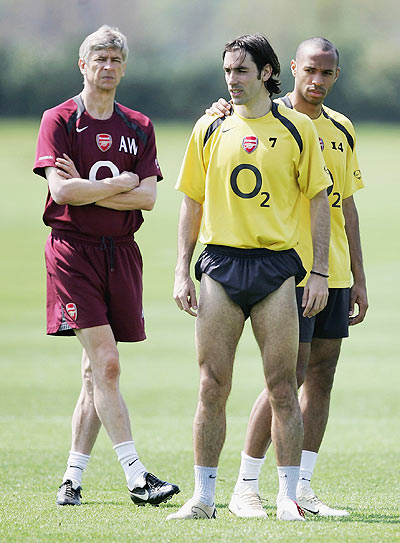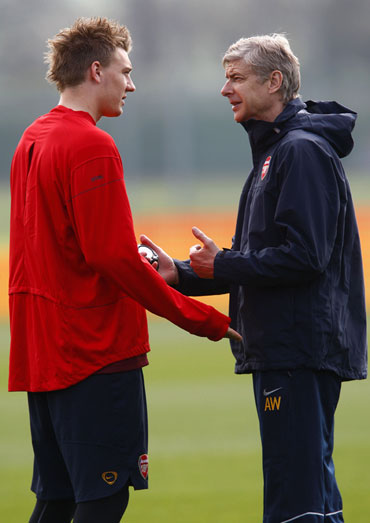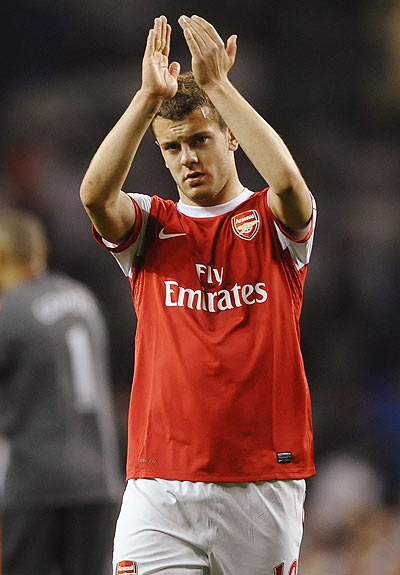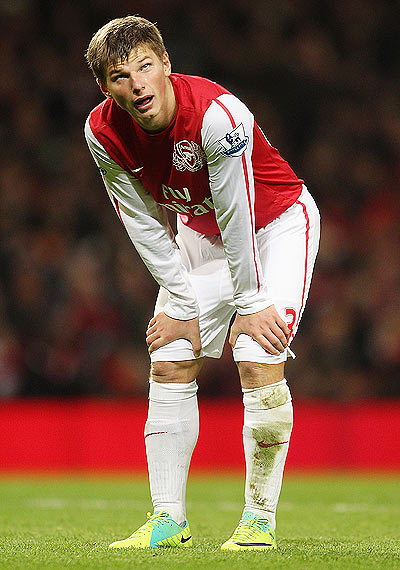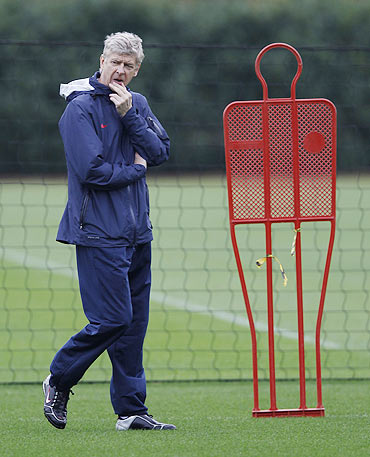 | « Back to article | Print this article |
The harsh reality of Arsenal's decline
It's been a year Arsene Wenger would want to forget as quickly as possible.
Two disappointing losses in the space of three days meant his Arsenal will end up empty-handed for the seventh straight year.
It's been a wretched season for the Frenchman (and his club) right from the start.
First, he was convinced (read coerced) to sell two of his most crucial players, Cesc Fabregas and Samir Nasri. Thereafter, he witnessed his team suffer as many as four defeats in their first seven league games of the season, something that prompted Wenger to give up on his title ambitions early.
If he expected his club would make up for their blunders in the league by winning any of the two cup competitions in England, or the 'big one' in Europe, it was not to be.
Arsenal's deconstruction began last August with successive early season defeats to rivals Liverpool and Manchester United (an 8-2 thrashing) and ended last week with reverses against AC Milan and Sunderland.
Of the two results, their 0-4 hammering in the Champions League first leg tie at the San Siro -- the club's worst defeat in 222 European matches -- made the second leg at the Emirates redundant, while the 0-2 defeat to fast-improving Sunderland ended Arsenal's hopes in the FA Cup. (The Gunners had exited from the League Cup late last year)
There's a good three months to go for the football season in England (and Europe) to get over. For Arsenal, though, it ended Saturday evening, leaving Wenger with the arduous task of offering explanations, none of which would sound convincing considering the club's performances this year, and in the six preceding seasons.
Great to begin with
"What does this Frenchman know about football? He wears glasses and looks more like a schoolteacher. He's not going to be as good as George [Graham]. Does he even speak English properly?"
The then Arsenal captain Tony Adams's words summed up the mood in North London when Wenger was named the replacement for Bruce Rioch in 1996.
The Frenchman had worked for many years in faraway Japan prior to this appointment and, therefore, was a relatively unknown name in the English media. He also happened to be the first 'non-British' manager of the club. 'Arsene Who?' screamed the headline of the Evening Standard newspaper following Wenger's appointment.
What worked for the Frenchman though was the fact that David Dein, the incumbent vice-chairman, had faith in his abilities.
To his credit, Wenger didn't disappoint. His new acquisitions, training methods and tactics ensured Arsenal finished third in his first year in charge.
In his second season, Wenger delivered the double. It didn't take that long for the next one to come.
In the 2001-02 season, a win over Chelsea in the FA Cup final was followed by a similar result over rivals Manchester United in the penultimate game, one that sealed the title. It was fitting that it was an away game, considering Wenger's side didn't lose on the road that year.
Two years later, Wenger's Arsenal made history by winning title without a single defeat, the first club to achieve the feat since the Premier League was established in 1992-93 and only the second ever -- after Preston North End in the 1888�� season.
The Frenchman also witnessed his team go on a record 49 league games unbeaten run and add two more FA Cup trophies (2003 and 2005) to their cabinet. Arsenal also did well in Europe, reaching the UEFA Cup final in 2000 -- losing to Turkish club Galatasaray on penalties -- and their first Champions League final in 2006 -- losing to Spanish giants Barcelona despite leading for most parts of the match in Paris.
His success ensured Wenger being regarded as one of the world's best managers, his approach to work earning him the sobriquet The Professor (Le Professeur).Dein, who had always stood by him, called him a "miracle worker".
Where are the trophies?
If Wenger had, in the first eight years of his tenure taken the club to dizzying heights, and unprecedented success, in the following seven he had to witness a downward spiral.
Following their Champions League final defeat to Barcelona, the club just made it to two League Cup finals, losing both -- to Chelsea in 2007 and Birmingham City last year.
Soon after Milan had thrashed Arsenal at the San Siro, Zlatan Ibrahimovic was quoted by the Italian media advising Robin van Persie to move to another club in order to win trophies.
The Swede, a winner of eight league titles in the past eight seasons, had made his point. Lack of silverware in the last few years has frustrated Arsenal players and fans alike.
Their last major trophy was that FA Cup in 2005. More importantly, none of the players in the current squad has won the league title, with only a couple of them winning anything at all.
Van Persie, for his goal-scoring prowess, has won precious little at the Emirates. The Dutchman, in his seven years at the North London club, has only an FA Cup (2005) and a Community Shield (2004) medal to show for his effort.
Considering he is almost 29, time is certainly running out for the former Feyenoord player.
The same was the case with former captain Fabregas. In his eight years with the Gunners, the Spaniard won the same honours as the Dutchman (two trophies).
Restless, and to a large extent frustrated, the 24-year-old moved to Barcelona at the start of the season even though he shared a good relationship with Wenger.
The fact that Fabregas has, in less than eight months, won three trophies -- the UEFA Super Cup, the Spanish Super Cup and the World Club Cup -- and is well on course for a fourth (the Copa Del Rey triumph is all but assured), justified his decision.
Nasri, on his part, was vocal regarding the Gunners' inability to win silverware in recent years.
"Arsenal is a great club. But (after) building the Emirates Stadium its financing has changed quite a bit. It has changed the ambitions for the moment," the 24-year-old was quoted as saying.
The Frenchman moved to Manchester City at the start of the season and his current club leads the Premiership with the 24-year-old playing a stellar role (something he did sans success at the Emirates).A questionable transfer policy
A major reason for Arsenal's failure to win titles owes to a miserly transfer policy.
The club has over the years refrained from making big purchases. For that matter, their 62-year-old manager has been criticized for his reluctance to spend.
Arsenal's most expensive acquisition of all-time, Russian Andrei Arshavin, was purchased from Zenit St Petersburg for about 15 million pounds. A paltry amount considering the sums paid to acquire big names these days.
What surprises more is the fact that the Gunners have only spent in excess of 10 million pounds on only six occasions. Besides Arshavin, the other lucky ones have been Frenchmen Sylvain Wiltord (13m), Nasri (11m) and Thierry Henry (10.5m), Spaniard Jose Antonio Reyes (10.5m) and Belgian Thomas Vermaelen (10m). Importanly, all those purchases followed bigger sales.
It hardly came in as a surprise when a survey in 2007 came up with the result that Wenger was the only Premier League manager to have made a profit on transfers.
A look at some of his dealings provides ample testimony to this.
Fabregas, who arrived in North London from Barcelona as a teenager in 2003, was sold to his former club for a cool 35 million pounds, more than enough money for Wenger to make a slew of moderate purchases and still save enough for the next transfer season.
The astute Frenchman had, a few years earlier paid Paris Saint-Germain (PSG) just 500, 000 pounds to but the talented Nicolas Anelka. When the latter was sold to Real Madrid a couple of years later, Arsenal had become richer by 23.5 million pounds, money that was used to get Henry, Wiltord and Robert Pires to North London.
Simply put, whenever Wenger has sold players, he has sold them big. He has made additions thereafter, but has refrained from spending big, thereby ensuring the account books are favourably balanced.
Poor choices, a far too many
A few of Wenger's decisions, regarding addition to the squad, have been spot on.
The likes Dennis Bergkamp, Henry, Sol Campbell, Giovanni van Bronckhorst, Marc Overmars, Emmanuel Petit, Fredrik Ljungberg, Fabregas, Van Persie and Nasri have been prized acquisition to say the least.
However, they are dwarfed by a lot many of Wenger's signing who can be termed as major blunders.
Think regarding the number of players, acquired in recent years, who did precious little to the club's cause and the list is endless.
Edu, Francis Jeffers, Lauren, Nicolas Anelka, Jose Antonio Reyes, Abou Diaby, Denilson, Eduardo, Nicklas Bendtner, Tomas Rosicky, Carlos Vela, Mathieu Flamini, Manuel Almunia, Sebastien Squillaci, Alexander Hleb...
Add to that the names of costly flops like Arshavin and Marouane Chamakh and you get a clear picture as to what has affected Wenger's credibility in recent years -- poor acquistions, and consequently the lack of results.
After selling both Fabregas and Nasri at the start of this season, Wenger made a slew of what can be termed 'panic buys.'
Per Mertesacker, Yossi Benayoun, Mikael Arteta, Park Chu-Young, Carl Jenkinson, Andre Santos, Gervinho and Alex Oxlade-Chamberlain have all been added to the squad.
Only the last two of those have impressed to an extent. But that's not saying much.
If Nasri is to be believed, it is the transfer policy itself that has left Wenger helpless.
"It is the policy of the club leaders. Arsenal no longer has the same resources. He (Wenger) cannot make the same moves as before the transfer market. Rather, he is obliged to sell its best players and bet on the young," the Frenchman has been quoted as saying to the media.Catch 'em young didn't always work
Even his harshest of critics accept the fact that Wenger is a good talent scout.
The Frenchman has built that reputation over the years by picking up a slew of young players who have proceeded to do well.
Since his days at AS Monaco, the club where he won his first trophies, Wenger has cultivated a ability for unearthing young talent.
While he was instrumental in bringing players like George Weah, Victor Ikpeba and Henry to Monaco, his contribution to Arsenal is far more significant.
The Frenchman can be credited for bringing in, and thereafter honing the skills of relatively unknown and inexperienced players like Patrick Vieira, Fabregas, Van Persie, Kolo Toure and Nasri.
However, while the strategy worked to good effect in the early part of his managerial stint at North London, it has backfired in recent years.
His persistence with the likes of Theo Walcott, Jack Wilshere, Bendtner, Vela, Denilson and the ilk has not only affected Arsenal's prospects in major competitions but also made the said players complacent.
There's no doubting the talents of the Walcotts and Wilsheres here. However, as far as consistency goes, these young talents have flatted to deceive.Misfiring tactics, questionable approach
Throughout his tenure, Wenger's emphasis has been on playing attacking football.
The Frenchman employed the conventional 4-4-2 formation to good effect in the early stages of his Arsenal career. However, after 2005 he took the 4-5-1 pattern, employing a five-man strong midfield and lone striker up front.
The system worked to an advantage at times when the likes of Fabregas, Nasri, Arshavin were there to pass to Van Persie. However, even though the new system ensured the club played some entertaining football, it couldn't guarantee consistency.
While Wenger has been appreciated for his tactical ability and technical flair, many have also opined that Arsenal entertain but do not deliver. The criticism has, to an extent, prompted the coach to revert back to the 4 formation with the front five changing positions at will.
In recent times, many of Wenger's decisions during a match have also come in for criticism.
The Frenchman, for example, was derided for his decision to substitute Oxlade-Chamberlain -- with an out of form Arshavin -- in Arsenal's 2-1 home defeat to Man United. The youngster had set up the equalizer for Van Persie only minutes earlier while the Russian's error resulted in United's winning goal.
Even though Wenger defended the substitution, the resultant defeat was Arsenal's third straight in the league -- for the first time since 2005 -- and left them five points adrift of fourth placed Chelsea in the battle for a Champions League spot, something that the Frenchman has admitted would be a "disaster" if his club misses out.
The 62-year-old has also been criticized for not strengthening his wretched defence, the prime reason behind Arsenal's many setbacks this season.Immediate future doesn't hold much promise
With Arsenal failing to win any trophies, the lone goal for Wenger this season is to grab that fourth and final Champions League berth.
It is not going to be easy though. While Man City, Man United and Tottenham Hotspur have more or less ensured their places in the top three, there is a four-way battle for the fourth spot, with Chelsea, Liverpool and Newcastle being the others.
Following 25 games, Arsenal are level on points with fourth-placed Chelsea.
However, that provides Wenger only temporary relief. Up next is a match against third-placed Tottenham, followed by a visit to Anfield. Games against Newcastle, Everton, Aston Villa and City follow.
Besides, Wenger also has to find replacements for both Fabregas and Nasri while also trying to retain Van Persie.
Arsenal's problems are far from over and their coach will have to do a lot more explanation in the days to come.
As mentioned at the outset, it's been a year Wenger would want to forget. But will he be allowed to?